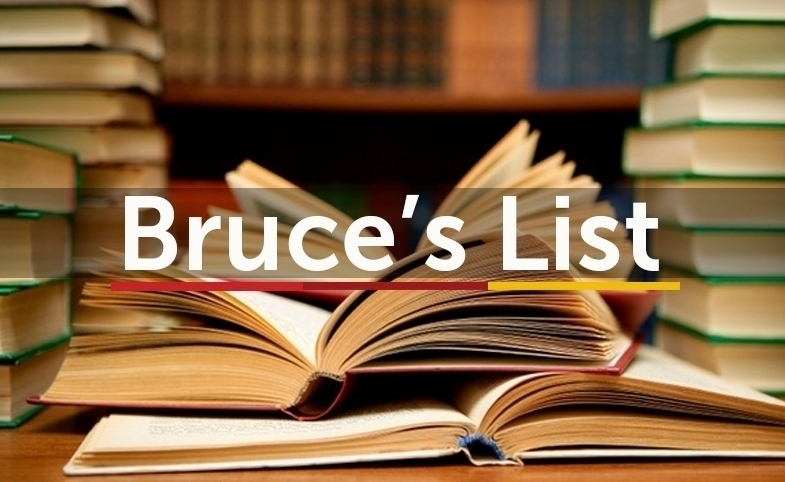
Latest Must-Reads in Public Diplomacy: May 2019
The May edition of CPD Faculty Fellow Bruce Gregory's public diplomacy reading list is now available. Known affectionately at CPD as "Bruce's List," this list is a compilation of books, journal articles, papers and blogs on a wide variety of PD topics and features a number of CPD scholars.
Highlights from this latest list include:
Bianca Baumler, “EU Public Diplomacy: Adapting to an Ever-Changing World,” CPD Perspectives, USC Center on Public Diplomacy, Paper 2, April 2019. Baumler (EU consultant and former EU communications officer in Syria and Ukraine) examines reputational, structural, and procedural challenges in the European Union’s public diplomacy. Her paper focuses on the EU’s Global Strategy; tools and methods of the European External Action Service; case studies of the EU’s public diplomacy in Ukraine, Indonesia, and Hong Kong; social media analytics and qualitative evaluation alternatives; and the value of outsourcing some public diplomacy work to public relations and communications professionals. She concludes with discussion of eight recommendations for diplomacy practitioners.
Nicholas J. Cull, Public Diplomacy: Foundations for Global Engagement in the Digital Age, (Polity, 2019). There is substance of considerable value in this book. Nick Cull (University of Southern California), public diplomacy’s premier historian, draws on years of teaching and research to provide what he calls “a single foundational text for diplomat students and student diplomats.” In imaginative prose he frames concepts, explains practitioners’ tools and methods, and offers much to ponder and debate. Cull has broadened his foundational template (listening, advocacy, cultural diplomacy, exchange diplomacy, and international broadcasting) to include nation branding and partnership, key elements that he argues have emerged from “the new public diplomacy.” He provides abundant empirical evidence for these ideas from a broad range of countries and three fully developed historical case studies: Britain in World War II, the U.S. in the Cold War, and the international campaign against apartheid in South Africa. Digital approaches and social media appear throughout as important issues and tools to be integrated in an understanding of diplomacy, not treated in isolation. He concludes with a discussion of today’s hot issue, “weaponized information.” Cull’s historical arc is long, but his most absorbing formulations turn on the central questions and conversations of today’s scholars and practitioners. We learn a great deal from his analysis, but we are left also with much still to discuss about public diplomacy, new public diplomacy, global engagement, and what is now an integral public dimension of diplomacy. See also CPD’s “Meet the Author.”
“Resist: Counter-Disinformation Toolkit,” Government Communication Service, United Kingdom, April 2019. Written by diplomacy and communications scholar James Pamment and his team at Lund University, this 69-page toolkit, published by the UK government, seeks to help public sector communication professionals prevent the spread of disinformation. The toolkit defines disinformation and the threats it poses to UK society, UK national interests, and democratic values. Presented with clear language and graphics, the report provides a guide to recognizing disinformation, situational analysis, strategic communication, early warning and digital monitoring, impact analysis, and tracking outcomes. The authors welcome comments, questions, and suggestions for revision. See also Jonathan Owen, “Exclusive: Government to Train Public Sector Comms Troops for Battle in Escalating Disinformation War,” PR Week, April 10, 2019.
Jan Melissen and Jian Wang, eds., “Special Issue: Debating Public Diplomacy: Now and Next,” The Hague Journal of Diplomacy, Volume 14 (2019), Issue 1-2 (April 2019). Melissen (Leiden University, HJD Co-editor) and Wang (USC Center for Public Diplomacy) have compiled debate-focused essays by leading and rising scholars on trends driving public diplomacy study and practice. The editors called for the essays to be shorter, forward-looking, and more argumentative than research papers, yet they are significant contributions to scholarship. Teachers and students will find them useful in university classes and foreign ministry training courses. See also “Hague Journal Special Issue Published,” CPD Blog, USC Center on Public Diplomacy.
Jan Melissen and Jian Wang, “Introduction: Debating Public Diplomacy”
Joseph S. Nye, Jr., (Harvard University), “Soft Power and Public Diplomacy Revisited”
Nicholas J. Cull, (University of Southern California), “The Tightrope to Tomorrow: Reputational Security, Collective Vision and the Future of Public Diplomacy”
Andrew F. Cooper, (University of Waterloo, Canada), “Adapting Public Diplomacy to the Populist Challenge”
Jennifer M. Brinkerhoff, (George Washington University), “Diasporas and Public Diplomacy: Distinctions and Future Prospects”
Erik K. Nisbet and Olga Kamenchuk (Ohio State University), “The Psychology of State-Sponsored Disinformation Campaigns and Implications for Public Diplomacy”
Corneliu Bjola, Jennifer Cassidy, and Ilan Manor (University of Oxford), “Public Diplomacy in the Digital Age”
Constance Duncombe, (Monash University, Australia), “Digital Diplomacy: Emotion and Identity in the Public Realm”
R. S. Zaharna, (American University) “Culture, Cultural Diversity, and Humanity-centered Diplomacy”
Geoffrey Wiseman (Australian National University), “Public Diplomacy and Hostile Nations”
Philip Seib, (University of Southern California), “US Public Diplomacy and the Terrorism Challenge”
Kejin Zhao, (Tsinghua University, China) “The China Model of Public Diplomacy and Its Future”
Caitlin Byrne, (Griffith University, Australia), “Political Leaders and Public Diplomacy in the Contested Indo-Pacific”
The full list, including works by CPD Blog Contributors Kadir Jun Ayhan, Paweł Surowiec, Chris Miles, Mariami Khatiashvili, Shawn Powers and Kim Andrew Elliott, is available here.
Visit CPD's Online Library
Explore CPD's vast online database featuring the latest books, articles, speeches and information on international organizations dedicated to public diplomacy.
Popular Blogs
-
January 29
-
January 20
-
January 28
-
January 2
-
February 6







